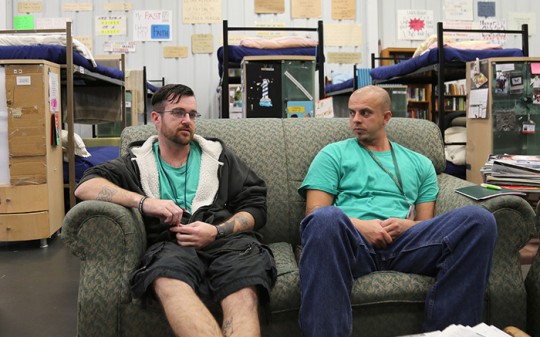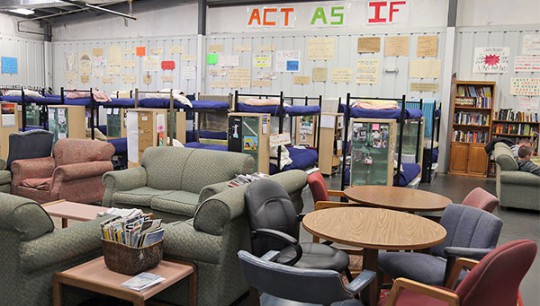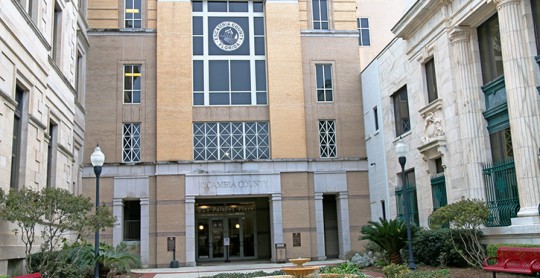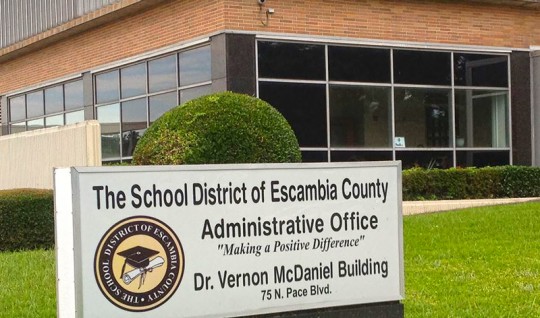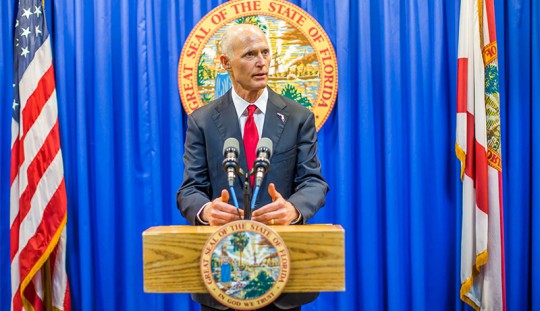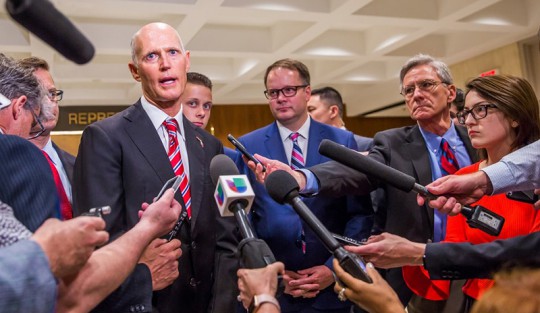Inmate, Veteran Recovery Program Provides Pathways To Change
March 18, 2018
Serving in Afghanistan left 29-year-old Army veteran Derick Zemke with a knee injury that would impact his life more than he could imagine.
Somewhere between surgeries and the pain that came with his injury, Zemke’s use of prescription pain medicine turned to abuse, escalating to dealing opioids and eventually using street drugs to sustain his habit.
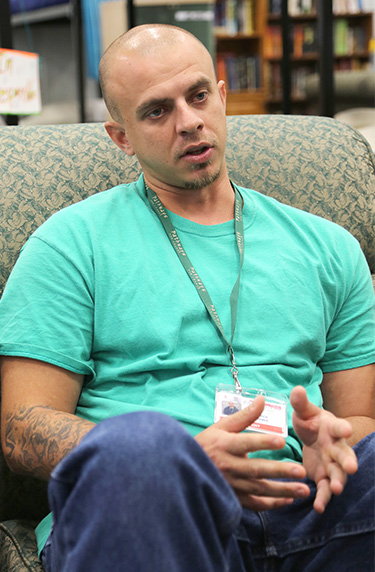 But after three and a half years in and out of jail, Zemke (pictured left) was ready to turn his life around. A fellow inmate told him about the Pathways for Change addictions treatment program, and he decided to go for it. Escambia County provides financial support to the program, which is housed at the Escambia County Work Release Center on West Fairfield Drive.
But after three and a half years in and out of jail, Zemke (pictured left) was ready to turn his life around. A fellow inmate told him about the Pathways for Change addictions treatment program, and he decided to go for it. Escambia County provides financial support to the program, which is housed at the Escambia County Work Release Center on West Fairfield Drive.
“I was a productive member of society before,” Zemke said. “I played high school football, baseball, basketball, made great grades, was in the Army. And I wanted to get back to what I used to be before the pain medicine.”
The Men’s Residential Treatment at Pathways for Change is an alternative sentencing option for non-violent criminal offenders who want to overcome destructive behaviors, attitudes and habits that prevent them from living a life free from crime and incarceration.
This year, Escambia County provided $175,000 to Pathways for Change, and an additional $168,750 was allocated to the county’s probation fund to house program participants. Historically, the county has provided $140,000 directly to Pathways for Change each year in addition to the $168,750 for housing.
Zemke started Pathways for Change in July 2017 and is set to graduate in January 2019, with plans to go to college in May to study hospitality and eventually work in the tourism industry.
Along with his physical injuries, Zemke has battled post-traumatic stress disorder since his time in Afghanistan, and his automatic response was to self-medicate and keep his feelings inside. But in Pathways for Change, he gave counseling a try, started working through a PTSD workbook and opened up about his struggles.
Zemke said his hope is that after he graduates, he can help other veterans who are facing challenges similar to his own.
“It’s hard to go talk to a doctor that’s never experienced the things that you’ve experienced and be open with them about it,” Zemke said. “But talking to another veteran, I feel that I can talk to somebody and I’ve been in the same exact place as them – using opioids, battling PTSD, feeling like an outcast or a black sheep. And if I can relate on that level with them, they’re more likely to open up and try to change…so that inspires me to keep doing this, and hopefully I can save more lives than just my own.”
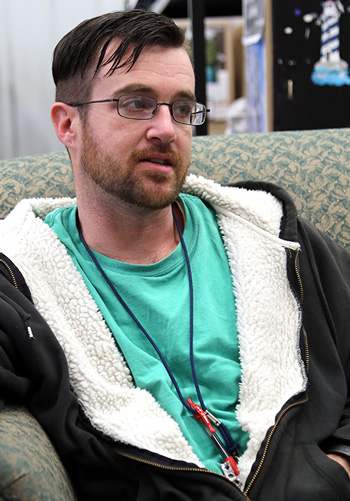 Army veteran Allen Townsend, 29, agreed that being able to openly talk with others is a significant benefit to being in the program. Townsend began drinking heavily after his first deployment to Iraq, eventually moving on to meth and dealing drugs.
Army veteran Allen Townsend, 29, agreed that being able to openly talk with others is a significant benefit to being in the program. Townsend began drinking heavily after his first deployment to Iraq, eventually moving on to meth and dealing drugs.
After a two-month crime spree with his wife that left him charged with 28 felonies, he was ready to serve his 10-year minimum rather than enter Pathways for Change. His wife and oldest daughter convinced him otherwise, and he decided to give the program a chance.
“Without this program, I would definitely be out using again,” Townsend (pictured left) said. “I have learned to trust other people, other men, which is something I haven’t done since the Army. It’s a great support group – guys I can talk to, and they’re honest to me.”
Townsend will graduate in October of this year, with plans to complete an IT training program and move to Colorado to start fresh. With his wife still battling a drug addiction, Townsend is estranged from his family. He said Pathways for Change has become his family.
“These guys want me to succeed as much as I want them to succeed,” Townsend said. “I could have known these guys my whole life from what we’ve been through together.”
Navy veteran McArthur Franklin, 44, is nearing the end of his time in Pathways for Change, with his graduation set for April. After an injury forced him to leave the military, he fell into drug and alcohol addiction and suffered from PTSD.
Franklin said the program is not for the faint of heart, but the challenge is worth it.
The four-phase, 18-month program includes basic living and communication courses, group therapy, individual therapy and community service, with the final phase of the program allowing participants to live outside of the center and report back for periodic drug screenings.
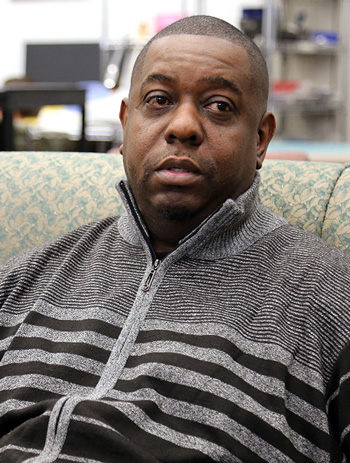 “There’s a lot of rules here that you’ve got to follow, and if you don’t really want to be here, you’re not going to do it,” Franklin (pictured left) said.
“There’s a lot of rules here that you’ve got to follow, and if you don’t really want to be here, you’re not going to do it,” Franklin (pictured left) said.
Pathways for Change also connected Franklin with veteran-specific services like Volunteers of America, which helped him get an apartment of his own. Franklin is enrolled in barber school at Pensacola State College and plans open his own barber shop after he graduates.
“They’re teaching us that it’s a better way of life to focus on goals and actually try to complete them,” he said. “They’re pretty much dedicated to helping us, the people here actually are genuine and they show that they care.”
Lt. Anita Hemphill, the first lieutenant over security at the Escambia County Work Release Center, said the county supports programs like Pathways for Change that offer alternatives to incarceration.
“Pathways for Change is a solidified program that helps with recidivism,” Hemphill said. “It’s a very disciplined program – I think it has to be disciplined for someone to be put to the test and see if they’re really ready to make that lifestyle change and become productive citizens in the community.”
Escambia County Corrections Director Tammy Jarvis also emphasized the importance of alternatives to incarceration, which she said are an excellent way to assist nonviolent offenders in dealing with mental health, anger management and addiction issues.
“Incarceration alternatives help offenders transition from the lifestyle that got them into jail to having stable employment, becoming self-sufficient and maintaining a crime-free life,” Jarvis said.
Each crime avoided also benefits the community in reduced victimization and reduced costs, Jarvis said, since criminal justice costs are driven by volume of activity.
“Reducing recidivism can help reduce overall volume of activity, which in turn results in long-term savings,” Jarvis said. “Programs such as this provide a long-term investment in our community by providing those served with the support they need to restructure their lives and achieve success.”
Photos for NorthEscambia.com, click to enlarge.
Molino Kitchen Fire Quickly Extinguished
March 18, 2018
A kitchen fire quickly extinguished.
 About 7:15 p.m., area fire departments responded to a reported house fire in the 4400 block of Highway 95A, near Richardson Road. The occupants of the home had extinguished the fire before firefighters arrived on scene a few moments later. The fire was reportedly due to cooking.
About 7:15 p.m., area fire departments responded to a reported house fire in the 4400 block of Highway 95A, near Richardson Road. The occupants of the home had extinguished the fire before firefighters arrived on scene a few moments later. The fire was reportedly due to cooking.
There were no injuries reported.
The Molino, Cantonment, McDavid, Ensley and Bellview stations of Escambia Fire Rescue were dispatched to the call, but many units were canceled prior to arrival.
File photo.
FDOT: Weekly Traffic Alerts
March 18, 2018
Drivers will encounter traffic disruptions on the following state roads in Escambia and Santa Rosa counties as crews perform construction and maintenance activities.
Escambia County:
- U.S. 29 Resurfacing between U.S. 90 and Muscogee Road – Alternating and intermittent lane closures on U.S. 29, from Muscogee Road to West 9 ½ Mile Road, from 8 p.m. to 6 a.m. Friday, March 16 and Saturday, March 17 as crews pave the roadway.
- State Road (S.R.) 742 (Creighton Road) Construction Improvement Project from east of Davis Highway to Scenic Highway- Intermittent and alternating lane closures between Davis Highway and Scenic Highway from 8:30 p.m. to 5:30 a.m. Sunday, March 18 through Saturday, March 24 continue as crews perform milling, paving, sidewalk and curb replacement.
- U.S. 98 Pensacola Bay Bridge Replacement – Alternating east and westbound lane closures between 14th Avenue in Pensacola and Bay Bridge Drive in Gulf Breeze, from 8 p.m. to 5 a.m. Sunday, March 18 through Sunday, March 25 as crews perform construction activities.
- U.S. 29 Widening from I-10 to Nine Mile Road- Drivers traveling U.S. 29 and Nine Mile Road will encounter traffic pattern changes from 8 p.m. to 6 a.m. Sunday, March 18 through Saturday, March 24 as follows:
-
- Nine Mile Road at the U.S. 29 overpass: North and southbound traffic will be reduced to one lane in each direction. Alternating traffic shifts will direct all traffic onto the westbound or eastbound lanes as crews continue construction of the new center bridge deck. Nine Mile Road lane restrictions are Sunday through Friday
- U.S. 29 between I-10 and 9 1/2 Mile Road: Drivers may experience alternating lane closures as crews continue drainage and paving operations. U.S. 29 lane restrictions are Monday through Saturday.
- S.R. 95 Underground Utility Work Between Salter’s Lake Road and S.R. 4 in Century- The northbound, outside lane between Salter’s Lake Road and S.R. 4 will be closed from 5 p.m. to 5 a.m. Monday, March 19 through Monday, April 23 as crews perform underground utility work.
- S.R. 750 (Airport Boulevard) Resurfacing) from Davis Highway to 9th Avenue- Activities are scheduled to begin the week of Monday, March 19. Drivers can expect intermittent lane restrictions, however, work requiring lane closures will take place at night between 9 p.m. and 6 a.m. There will be temporary sidewalk closures during removal, replacement, and new construction. Pedestrians will have sidewalk access on at least one side of the roadway at all times.
- Interstate 10 (I-10) / U.S. 29 Interchange Improvements Phase I- The I-10 westbound outside (right) travel lane near the railroad overpass remains closed to traffic as crews complete drilled shaft operations for overhead sign installation.
Santa Rosa County:
- U.S. 98 (S.R. 30) Pensacola Bay Bridge Replacement – Alternating east and westbound lane closures between 14th Avenue in Pensacola and Bay Bridge Drive in Gulf Breeze from 8 p.m. to 5 a.m. Sunday, March 18 through Sunday, March 25 as crews perform construction activities.
- I-10 Widening from Escambia Bay Bridge to Avalon Boulevard (S.R. 281/Exit 22) Alternating lane closures on I-10, from the Escambia Bay Bridge to east of S.R. 281 from 8 p.m. to 6 p.m. Sunday, March 18 and Monday, March 19 as crews perform asphalt repair operations.
- U.S. 90 Safety Project at West Florida Baptist Academy- Activities are scheduled to begin in April to construct an eastbound, left turn lane in front of West Florida Baptist Academy in Milton. Drives can expect intermittent lane restrictions, however, there will be no lane closures between 6 a.m. and 8 p.m.
- S.R. 87 Multilane from Eglin AFB boundary to Hickory Hammock Road – Traffic between County Road 184 (Hickory Hammock Road) and the Eglin AFB boundary is restricted to loads less than 11-feet wide. The restriction will be in place until the project is complete.
All activities are weather dependent and may be delayed or re-scheduled in the event of inclement weather. Drivers are reminded to use caution, especially at night, when traveling through a work zone and to watch for construction workers and equipment entering and exiting the roadway.
Escambia BOCC Weekly Meeting Schedule
March 18, 2018
Here is a schedule of Escambia County public meetings for the week of March 19-23:
Monday, March 19
Amalgamated Transit Union 1395 Collective Bargaining Session – 10 a.m., ECAT Administrative Offices, 1515 W. Fairfield Drive
Tuesday, March 20
Board of Electrical Examiners – 9 a.m., Escambia County Central Office Complex, 3363 West Park Place
Amalgamated Transit Union 1395 Collective Bargaining Session - 10 a.m., ECAT Administrative Offices, 1515 W. Fairfield Drive
Environmental Enforcement Special Magistrate – 1:30 p.m., Escambia County Central Office Complex, 3363 West Park Place
Escambia County Health Facilities Authority – 4 p.m., 1019 N. 12th Ave.
HUD Annual Plan Public Hearing – 5:30 p.m., 420 W. Chase St.
Wednesday, March 21
Escambia Soil and Water Conservation District Board – 8 a.m., 151 Highway 97, Molino
Board of Adjustment – 8:30 a.m., Escambia County Central Office Complex, 3363 West Park Place
Sick Leave Pool Committee – 11 a.m., Ernie Lee Magaha Government Building, 221 Palafox Place
Development Review Committee – 1 p.m., Escambia County Central Office Complex, 3363 West Park Place
NorthEscambia.com photo, click to enlarge.
Florida Gov’t Weekly Roundup: Tragedy Hits Home Again
March 18, 2018
TALLAHASSEE — As Floridians continue to process the incomprehensible slaughter of 14 children and three staff members at Marjory Stoneman Douglas High School, another catastrophe struck South Florida this week when a pedestrian bridge collapsed at Florida International University.
The latest tragedy, which left at least six people dead and at least as many injured, came less than a week after Gov. Rick Scott signed a bill that had been quickly put together in response to the deaths at the Broward County high school, the nation’s second-worst school shooting.
 The collapse of the 950-ton pedestrian bridge eclipsed other dreadful news Thursday: the release of a video showing Marjory Stoneman Douglas High school-resource officer Scot Peterson standing outside the building where gunman Nikolas Cruz was picking off students.
The collapse of the 950-ton pedestrian bridge eclipsed other dreadful news Thursday: the release of a video showing Marjory Stoneman Douglas High school-resource officer Scot Peterson standing outside the building where gunman Nikolas Cruz was picking off students.
Just a day before the release of the video, students nationwide participated in a school walk-out to show their allegiance to the Parkland school and to honor the teenagers and faculty who died.
But on Friday, the country’s eyes were turned to the cars trapped beneath the rubble in Miami-Dade County, where authorities had abandoned hope of recovering anyone alive.
It’s another national moment for the governor, who has assumed the dubious distinction of the state’s mourner-in-chief.
Scott quickly joined local and federal officials on the scene, promising a full investigation and pointing the finger at the university for the disaster.
With the end of the legislative session and what feels like perpetual anguish for many of those even far removed from the tragedies in Parkland and Miami, perhaps it’s time to set aside the snark and the sarcasm and focus on compassion and kindness.
“Everything we do, every step, every breath should bring joy and happiness to us,” Buddhist monk Thich Nhat Hanh advised on Twitter this week. “Life is already full of suffering; we don’t need to create more.”
ALL ABOUT THE BENJAMINS
The week began on a unified note with the Legislature finishing its business Sunday, a tad overdue, by passing the state’s $88.7 billion budget.
And Scott — who will be forced to leave office this year due to term limits — wasted little time completing the work on his last Florida spending plan. The governor signed the budget Friday, using his using his red pen to slash $64 million in projects and other budget decisions.
“Today, Florida is strong and I am proud of our hard work over the past seven years to grow the economy, invest in education, protect the environment and keep our families safe,” Scott wrote in a budget-transmittal letter to Secretary of State Ken Detzner. “While this is my final budget as governor, I am confident that the Securing Florida’s Future budget will continue to advance the priorities of Florida families for years to come and keep Florida’s future strong.”
The budget includes tax cuts, one of Scott’s chief priorities.
And it includes what Scott called “record funding” for K-12 schools — which will receive an average $101.50 per-student bump — and the university system, where performance funding was increased by $20 million.
The state’s school superintendents, however, were not happy with the K-12 funding, saying the way it was structured gives districts too little money to address rising operational costs. The superintendents asked Scott to call a special session to address the issue — an idea Scott effectively rejected in signing the budget.
The budget also includes $65 million to deal with the state’s opioid crisis, which was another priority for the governor.
Scott praised pay raises in the spending plan for law enforcement officers, including the Florida Highway Patrol, and workers at the Department of Juvenile Justice.
And he lauded the Legislature’s support for requiring nursing homes and assisted living facilities to have generators to provide backup power. That became an issue after residents of a Broward County nursing home died following Hurricane Irma.
But Scott, as well as Senate President Joe Negron and House Speaker Richard Corcoran, said the 2018 session may be best remembered for the response following the Feb. 14 mass shooting at the Parkland high school.
The shooting led to a $400 million school-safety initiative and legislation imposing new restrictions on gun purchases.
“Probably the most important thing we did this year is we listened to the families of Parkland. In very short period of time, we came together and passed historic legislation to make our schools safer,” Scott said Sunday. “This is my last regular legislative session, and I couldn’t be more proud of this session than all eight sessions I’ve been a part of.”
LAWYERS, GUNS AND MONEY
The Florida Constitution Revision Commission, which wrapped up public hearings this week, will be the latest host of the gun-control debate.
Facing a May 10 deadline, the commission will start meeting Monday in the Senate chamber in Tallahassee as it considers what proposals to place on the November ballot.
The panel, which meets every 20 years and has the unique power to place issues directly on the ballot, has scheduled seven floor sessions to wade through three-dozen proposals before March 27.
One measure (Proposal 3), sponsored by Commissioner Roberto Martinez of Miami, will certainly spark debate, as it has attracted several amendments related to gun control in the wake of the Valentine’s Day massacre in Parkland.
The proposal was initially designed to remove an obsolete provision in the Florida Constitution that bars illegal immigrants from owning land.
But Martinez, a former federal prosecutor, has filed an amendment that would also require anyone purchasing a firearm to be 21 years old. And it would require at least a three-day waiting period after a gun purchase to carry out a “comprehensive background check.” It would ban “bump stocks,” devices added to weapons to greatly increase their firing capacity.
The provisions are already included in the law signed last week by Scott, but placing them in the Constitution would prevent future legislatures from undoing the restrictions. The National Rifle Association has filed a lawsuit challenging the age requirement.
Meanwhile, Commissioner Chris Smith of Fort Lauderdale has another proposed amendment that would ban assault-style weapons.
Also, Commissioner Hank Coxe of Jacksonville has filed an amendment that would raise the age of buying a firearm to 21 and would impose a 10-day waiting period. It also would ban bump stocks. Commissioners Arthenia Joyner of Tampa, Sherry Plymale of Palm City and Frank Kruppenbacher of Orlando support Coxe’s amendment.
Another controversial proposal up for consideration would remove from the state Constitution the so-called “no-aid” provision, which prevents public spending on churches and other religiously affiliated groups.
Other proposals would require all school superintendents to be appointed; ban greyhound racing; require businesses to use E-Verify or a similar system to determine the immigration-related eligibility of employees; and ban vaping in workplaces.
STORY OF THE WEEK: Gov. Rick Scott signed the state’s $88.7 billion budget, vetoing $64 million in projects and budget decisions.
QUOTE OF THE WEEK: “It’s exactly the opposite of what we had intended, and we want to extend our deepest condolences to the family and loved ones of those who have been affected. The bridge was about collaboration, about neighborliness, about doing the right thing, but today, we’re sad. And all we can do is promise a very thorough investigation, getting to the bottom of this, and mourn those who we’ve lost.” — Florida International University President Mark Rosenberg, after the collapse of a pedestrian bridge at the school killed at least six people Thursday..
by Dara Kam, The News Service of Florida
Thomas: Armed Security Coming To All Schools, Fulltime SRO’s Already Return To Northview, Ernest Ward
March 17, 2018
Armed security is coming to all traditional Escambia County schools, as full-time school resource officers have returned to Ernest Ward Middle and Northview High schools.
Beginning Monday, a new plan will take effect in Escambia County Schools that will provide armed security at all elementary schools in addition to school resource officers currently assigned to middle and high schools.
After cutbacks in the SRO program, Northview High School and Ernest Ward Middle School were sharing a single SRO, but Escambia County School Superintendent Malcolm Thomas said a full time SRO was assigned to each campus this week. “Northview and Ernest Ward were problematic due to distance so I that moved was already made this week,” he said.
“The district will work with local law enforcement agencies; the Escambia County Sheriff and the City of the Pensacola Police Department, as well as contract security vendors to achieve the objective of providing armed security in elementary schools, while maintaining the School Resource Officers we already have assigned to our middle schools and high schools,” explained Superintendent Thomas. “The sole purpose of these officers will be to provide security on our campuses.”
When law enforcement officers are not available, security personnel from Securitas will bridge the gap.
But some schools, which Thomas declined to name for security reasons, may not yet have an armed officer on Monday morning.
He said the objective is to provide armed security to schools, while cautioning that achieving this goal will take time to build the capacity and availability of security personnel. “It will take time to identify all of the officers, and also ensure contracted security personnel have the proper credentials. “Campus assignments will increase as we work toward adding coverage for all of our elementary schools,”
The plan is expected to cost an extra $303,000 for the remainder of the school year, according to school board vice chair Patty Hightower. The district will spend $171,000 on sheriff’s deputies and police officers, and $132,000 for armed security from Securitas. She said the money is already in the district’s budget.
Under legislation that will be in effect by next school year, school districts must hire security officers or arm teachers. The Escambia County School District has chosen not to arm teachers.
“That is too much to impose on our teachers, too much to ask,” Thomas said. “It would take each teacher a minimum of 148 hours of training to have a weapon at school.”
Earlier this week, the Escambia County Commission reached an budget concession agreement with Escambia County Sheriff David Morgan. That agreement calls for 50 percent of Law Enforcement Trust Fund monies to go toward SRO’s where feasible. But since that annual amount varies because it is from seizures, it can’t be properly budgeted.
“If the sheriff is able to return the SRO’s he cut at the beginning on this school year, that’s a good thing. But I do not like funding with a fund source that is variable. I prefer to have a budget amount that is sustainable,” Thomas said, adding that the school district has a good working relationship with the ECSO and Pensacola Police.
“We’re committed to supporting the Escambia County School District” said Sheriff David Morgan.
The Escambia County School Board is expected to act upon the superintendent’s recommendation next week.
Scott Vetoes $1 Million For Beulah Beltway, Nearly $1 Million For UWF
March 17, 2018
When Gov. Rick Scott signed Florida’s nearly $89 billion state budget, he vetoed $1 million for a Beulah Interchange Connector and $931,439 for the University of West Florida archaeology program/
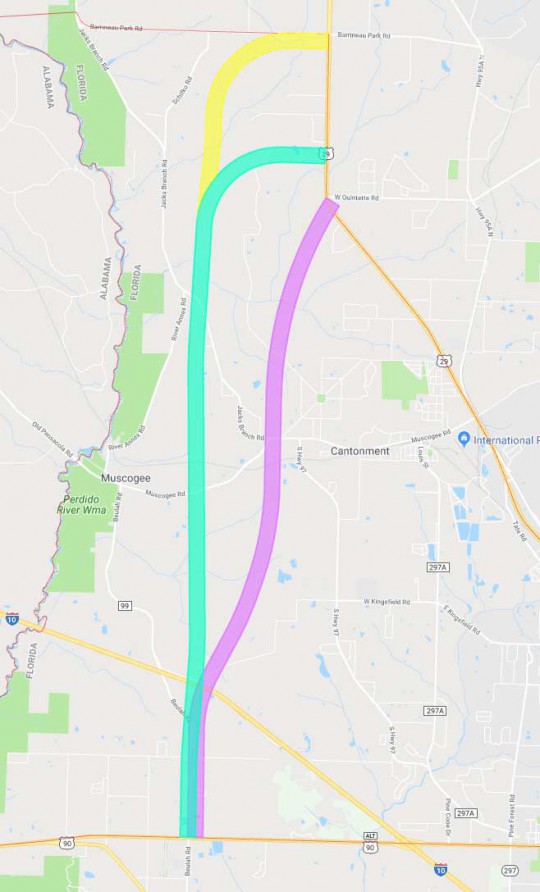 The Beulah Beltway project proposes to a build a new four-lane highway over about 11 miles to connect West Nine Mile Road to Highway 29, including a new interchange with I-10. The I-10 interchange and southern segment along Beulah Road are expected to begin construction in 2023. At this time there is no identified funding for the construction of the northern segment, and no time frame estimate.
The Beulah Beltway project proposes to a build a new four-lane highway over about 11 miles to connect West Nine Mile Road to Highway 29, including a new interchange with I-10. The I-10 interchange and southern segment along Beulah Road are expected to begin construction in 2023. At this time there is no identified funding for the construction of the northern segment, and no time frame estimate.
Scott said the $1 million in funding for the Beulah project was vetoed along with other transportation project because “these projects circumvent the Transportation Work Program”.
He said the UWF archaeology program funding was “vetoed because University of West Florida receives operational funding with which the institution has the flexibility to support such initiatives based upon their priorities. Since Fiscal Year 2011-12, University of West Florida’s operating funding has increased by $43.7 million.”
Related story: Scott Signs Budget, Takes It Easy On Vetoes
Photos for NorthEscambia.com, click to enlarge.
Century Historic Preservation Board To Meet
March 17, 2018
The Century Historic Preservation Board will meeting Wednesday, March 21 at 11 a.m. at town hall to review site and architectural plans for the placement of one housing unit at 581 Church Street.
The home is located withing the Alger-Sullivan Lumber Company Residential Historic District and was damaged as a result of the February 15, 2016, tornado.
For more information, call Interim Town Clerk Kim Godwin at (850) 256-3208 or Town Planner Debbie Nickles at (850) 982-3984.
Scott Signs Budget, Takes It Easy On Vetoes
March 17, 2018
With a light touch of his veto pen, Gov. Rick Scott on Friday signed a new $88.7 billion state budget, eliminating only $64 million in spending and projects, the lowest total of his seven-plus years as governor.
“Today, Florida is strong, and I am proud of our hard work over the past seven years to grow the economy, invest in education, protect the environment and keep our families safe,” Scott said in a budget message.
He said his final budget as governor “will continue to advance the priorities of Florida families for years to come and keep Florida’s future strong.”
Scott wasted little time in dealing with the budget, which was passed by the House and Senate on Sunday and delivered to him Wednesday. The budget will take effect July 1.
Related story: Scott Vetoes $1 Million For Beulah Beltway, Nearly $1 Million For UWF
His $64 million in vetoes was lower than the $69 million he eliminated in 2014, when he was running for re-election. Scott, a Republican, is considering a run for the U.S. Senate this year against Bill Nelson, the Democratic incumbent. This year’s vetoes represent a little more than 10 percent of the $615 million Scott eliminated in his first year in office in 2011, his high mark for vetoed spending.
But rather than focus on the vetoes Friday, Scott emphasized the spending initiatives in the new budget, as well as a tax-cut package that includes sales-tax “holidays” and a slight reduction in a commercial-lease tax. The budget plan also avoided $377 million in increased property taxes for schools because lawmakers decided to roll back a tax rate.
In an interview Friday with The News Service of Florida, Senate President Joe Negron, R-Stuart, said he was pleased with the governor’s support for the Senate’s initiatives, including a $122 million increase in funding for Bright Futures college scholarships.
“I think the vetoes were very modest, and I’m grateful to the governor for his consideration of Senate priorities,” Negron said.
While Scott and Republican legislative leaders have touted the budget, the Florida Association of District School Superintendents this week asked Scott to call a special session to increase funding for the 67 school districts. Although the budget includes a $101.50 increase in per-student funding, the superintendents said districts, on average, would only see a 47-cent increase in basic funding per-student because much of the new money was targeted for mental health and safety issues following last month’s mass shooting at Marjory Stoneman Douglas High School in Broward County.
In signing the budget, Scott rejected that request, emphasizing the “record” level of funding for the kindergarten-through-high-school system, including a $485 million increase over the current year.
He also cited the $400 million school-safety initiative, which will increase funding for mental-health services, school resource officers and security improvements at schools after the Feb. 14 mass shooting that killed 17 people.
by Jim Turner, The News Service of Florida
Rain Reschedules Branden Penegar Car Show For March 31
March 17, 2018
Due to rain this weekend, the annual Brandon Penegar Memorial Car Show has been rescheduled for Saturday, March 31.
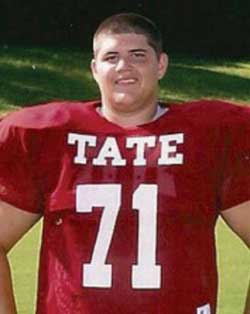 Any make, model or year car is welcomed for the show. Car registration will be from 8:00-11:00 a.m. on March 31. The fee is $15 to only display a car, $25 to enter the car in the show. Spectator admission is free. Click here for a printable flyer (pdf) with more information.
Any make, model or year car is welcomed for the show. Car registration will be from 8:00-11:00 a.m. on March 31. The fee is $15 to only display a car, $25 to enter the car in the show. Spectator admission is free. Click here for a printable flyer (pdf) with more information.
Branden Penegar, known as the “Gentle Giant” was a 2011 graduate of Tate High School, an assistant coach for the freshman Tate Aggies’ football program and varsity tennis team, and a member of the Tate High School Student Hall of Fame. He passed away in March 2013 at the age of 20. Penegar was a active member of the Gonzalez United Methodist Church and youth program.


